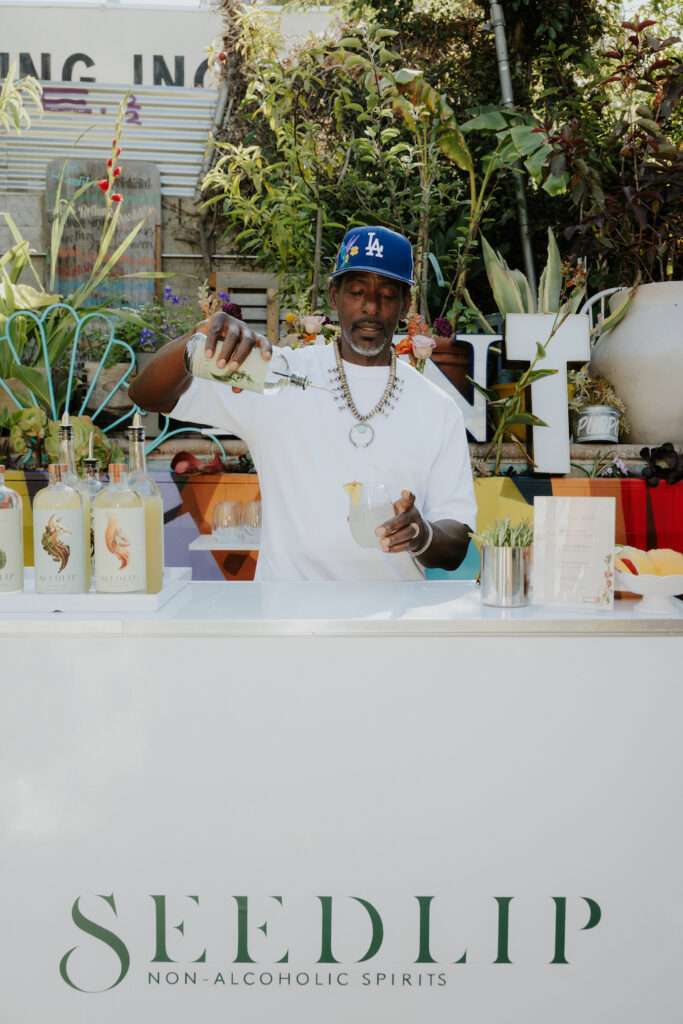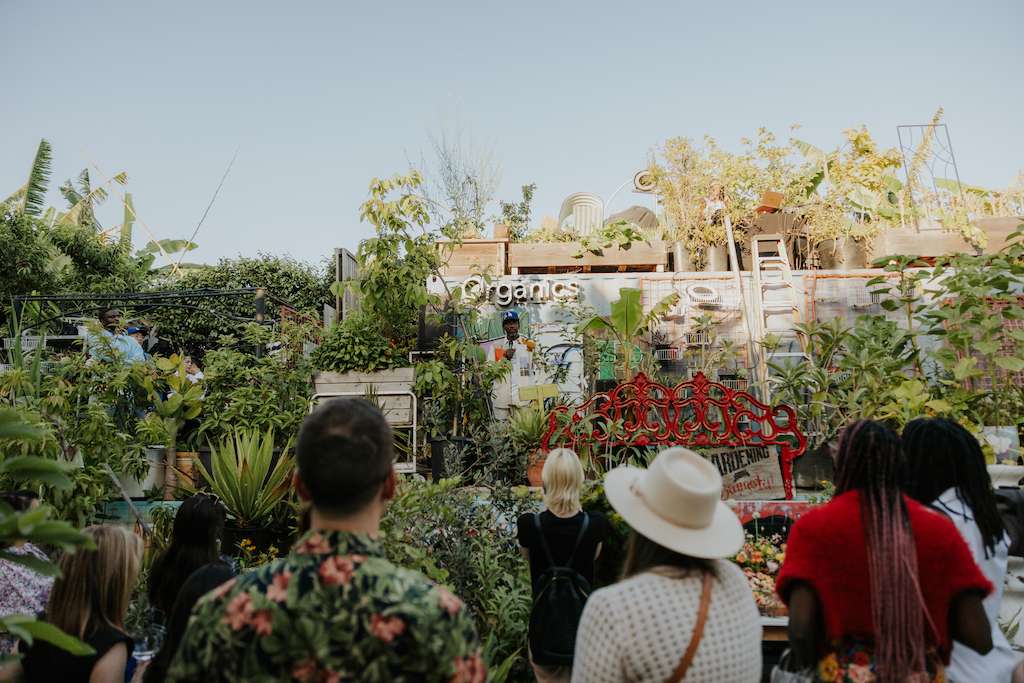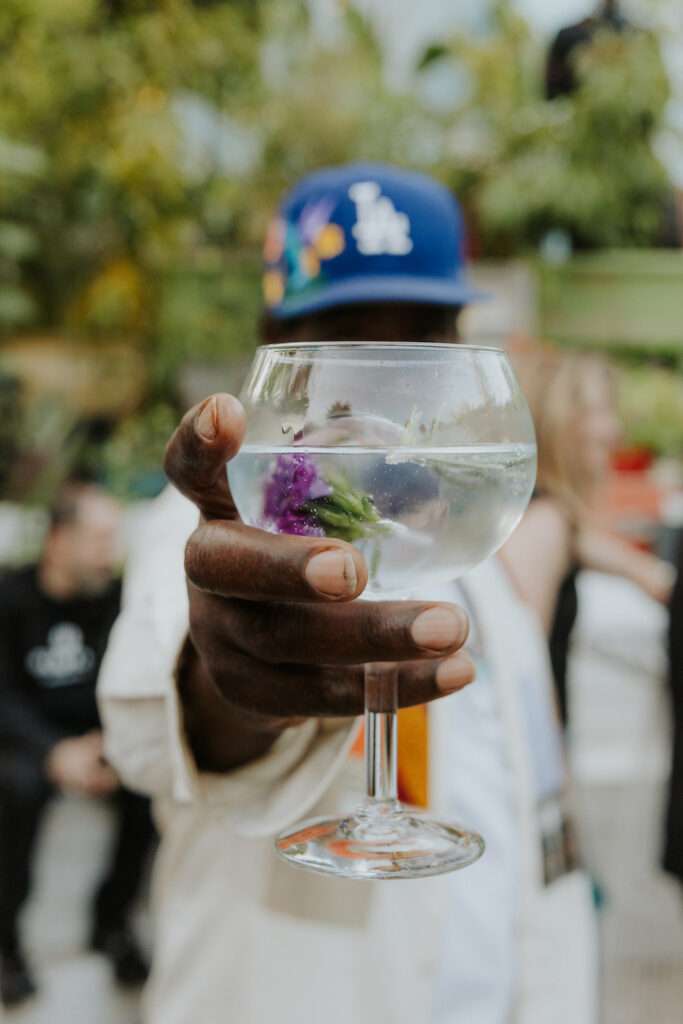A decade after his now-legendary TED Talk on food deserts, guerrilla gardener Ron Finley is partnering with zero-ABV label Seedlip to tackle another inner-city epidemic: alcohol.
“How would you feel if you had no access to healthy food?” That’s the question Ron Finley asked in his seminal 2013 TED Talk that’s been viewed more than 4 million times.
Long before California mandated food scrap composting, long before hipsters converted their backyards into urban chicken farms, and long before plants were menu darlings at fast food restaurants and fine dining establishments alike, Finley, a South Central Los Angeles native, started “planting some shit.”
Finley’s revolutionary “Gangsta Gardener” approach made him a bona fide celebrity — not just in his neighborhood, but in food-conscious communities across the country. The master gardener (Finley is also a fashion designer) said in his TED Talk that food is both the problem and the solution. Growing up in South Central’s food desert, the problem was all around him — fast food, liquor stores, and higher-than-average obesity rates.
So Finley became the solution.
His solution was to plant a food forest on the strip of land between his house and the street to help feed his community. He’s been planting ever since. “Growing your own food is like printing your own money,” he said in the 2013 video.
Fast-forward a decade, and now as an ambassador for the zero ABV brand Seedlip, Finley is helping people find an alternative to alcohol. While there’s a lack of fresh, healthy food in food deserts (the USDA estimates there are about 6,500 food deserts across the U.S.), there’s also frequently an overabundance of alcohol, which is linked to a host of health conditions. It’s partly why the sober movement is catching on. A 2021 NielsenIQ omnibus survey found 22 percent of consumers were cutting back on alcohol consumption.
For Finley, partnering with Seedlip, the world’s top-selling zero-ABV brand, was a no-brainer. Seedlip and the Ron Finley Project — Finley’s teaching arm that works with communities and individuals to help them grow food and support local biodiversity — are both involved in the 1% for The Planet initiative (Ethos is also a contributor).
Finley will be hosting a summer dinner series at his property in Los Angeles in partnership with Seedlip so that people can taste the products, which are being combined with seasonal ingredients grown in Finley’s garden.
For Finley, it’s also an opportunity to be in the present moment.
“I try with everything to not live in the future,” he told Ethos via email. “If we start holding on to the present, we would be more connected to what we’re doing.”

Finley says being present means you wake up every day and you get to design the life you want to live, “not the one that’s been designed for you.”
Being present is also at the heart of social drinking — connecting with friends and loved ones to unwind — but Finley and Seedlip say you can have that experience without all the drawbacks of alcohol. And with a zero-ABV cocktail in an urban LA garden dripping with summer berries, you may just find yourself more present than ever.
During the kick-off partnership event, held in Finley’s garden last week, Seedlip served up a number of cocktails that mixed seamlessly into the space where fruits, herbs, and flowers comingle with graffiti and eclectic art (Finley is also a collector of Blaxploitation posters).
A drained pool serves as host to a thriving pond. There’s a beehive. Fruits gently knock you in the head as you navigate under the canopy of trees where plants snake around your feet and obscure the barely visible patches of cement. Old sinks and tubs are filled with succulents. The more you look, the more you see and the more you find yourself a little lost in that present moment, too. And that’s exactly the point, says Finley.
We caught up with Finley to learn more about the Seedlip partnership and get his thoughts on gardening, sustainability, and community.
*This interview was edited for length and clarity.
Ethos: Can you share a bit about the partnership with Seedlip?
RF: It’s a short story. I mean, I knew what Seedlip stood for before I even saw the product — it comes from farmers. So, as far as I’m concerned, it’s in my bloodline. And what the product represents, and since I really don’t indulge in alcohol at all, it was perfect.

Seedlip’s standards are high — everything that they do, the caliber is just so high that it is a pleasure to be involved.
Ethos: Can you tell us a little bit about the dinner series with Seedlip and what you’re looking forward to there?
RF: I’m looking forward to the dinner series and putting the product in front of a lot more people, especially those that are having issues with other products [alcohol]. But the bottom line is to just go out and inspire people and have them participate in the gospel that is Seedlip and the Ron Finley Project.
Ethos: Is there a favorite drink you make with Seedlip? Maybe using the items in your garden?
RF: Of course. From mint to ginger to all kinds of different spices. Basil has a lot of uses. I mean, it’s kind of endless, especially when you’re dealing with nature.
Ethos: You’ve said that it’s important to collaborate with brands that are part of that 1% for the Planet initiative. Why is that important for you?
RF: I mean, why would I be involved with a company that’s mowing down trees? It makes no sense. So you partner with somebody that has the same interests, the same goal. And that’s what we’re dealing with here.

To me, it’s a no-brainer to get to partner with a company like Seedlip. And now, with the capacity Seedlip has to reach so many more people around the world, it’s a perfect engagement. It’s a perfect marriage.
Ethos: What advice can you give to someone who wants to start thinking a little bit greener, start thinking a little bit more about being sustainable in their life?
RF: First of all, go plant some shit. The second thing you could do is watch my masterclass.
One of the easiest things you could do is start composting. The second easiest thing is to get together with your neighbors and create a gardening club or gardening community.
Take somebody’s backyard and everybody works on it together and you share the bounty that you grow. Because now you’re building community with that. And you’re building friendships and also in the same neighborhood, you’re building safety. Because everybody knows everybody; you know the neighbors’ kids, and they know yours. It’s not just about food. That’s where people get lost. It’s always about more than just growing food.
Related on Ethos:

![Ron Finley toasts the Seedlip x The Ron Finley 1% For The Planet partnership launch in Los Angeles, CA with seasonal cocktails made with Seedlip Non-Alcoholic Spirits [1] Ron Finley with a cocktail](https://the-ethos.co/wp-content/uploads/2023/06/Ron-Finley-toasts-the-Seedlip-x-The-Ron-Finley-1-For-The-Planet-partnership-launch-in-Los-Angeles-CA-with-seasonal-cocktails-made-with-Seedlip-Non-Alcoholic-Spirits-1-696x1043.jpg)
